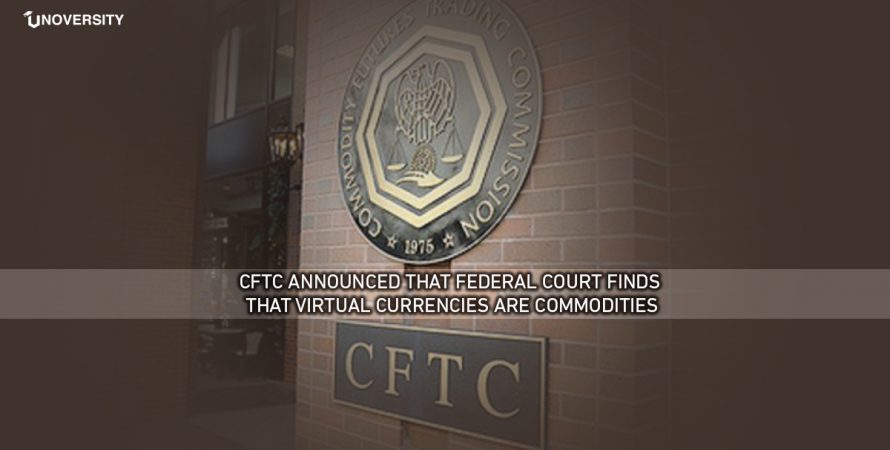The United States Commodity Futures Trading Commission (CFTC) published a press release on October 3rd which stated that the U.S federal court assigned Virtual Currencies as Commodities and the CFTC has the power to indict fraud involving virtual currency.
CFTC Director of Enforcement, James McDonald said commenting on the court order:
“This is an important ruling that confirms the authority of the CFTC to investigate and combat fraud in the virtual currency markets. This ruling…recognizes the broad definition of the commodity under the CEA, and also that the CFTC has the power to prosecute fraud with respect to commodities including virtual currencies. We will continue to police these markets in close coordination with our sister agencies.”
This judgment was passed as a part of a case from September 2018 where the originators of cryptocurrency “My Big Coin” (MBC) were indicted with fraud. CFTC had appropriately declared that MBC was a commodity under the Commodity Exchange Act because it is a virtual currency.
Senior Judge Rya W. Zobel of the U.S. District Court for the District of Massachusetts agreed to CFTC’s position leading to the fact that Bitcoin futures are currently being treated as commodities and are under CFTC jurisdiction.
The court also said the broad definition of commodities as goods, articles, and services “in which contracts for future delivery are presently or in the future dealt in.”
The court also rejected the MBC’s claim that the CFTC could only indict them based on market manipulation, stating that the broad interpretation of commodities involved any kind of fraud, whether or not market manipulation had happened.
MBC had been cheating traders since 2014 by persuading them to buy the cryptocurrency which was, in fact, a sham. The creators of MBC prompted investors to assume the token could be used for trading and was backed by gold.
“Defendants[MBC] misappropriated customer funds by conning people into giving them more than $6 million,” instead of the raised money into the project’s improvement, they spent it on homes, jewelry, and fine art, according to the court.
This decision has established the CFTC’s ability to prosecute cryptocurrency fraud and also brings virtual currencies under the CFTC’s authority.
On October 1st, CFTC Chairman J. Christopher Giancarlo , In an interview with CNBC’s fast money, termed the cryptocurrency ecosystem a “two-handed approach,” one hand are regulatory authorities who can help shield investors and counter fraud, and on the other those who would bring in innovation in cryptocurrency.
Giancarlo also said in the interview that, “I personally think that cryptocurrencies are here to stay. I think there’s a future for them.”
He also mentioned that a low and cautious approach will likely be required to help institutions like the Securities and Exchange Commission (SEC) and CFTC figure out precisely how to regulate and deal with cryptocurrencies.
Today is the first day of the CFTC’s first-ever Financial Technology conference happening in Washington, D.C. The attendees include regulators, thought leaders, traders, and the general public. The conference is called “FinTech Forward 2018: Innovation, Regulation, and Education,” will examine:
Key emerging technology trends and developments
- Regulating crypto asset markets
- Evolving tokenization
- Safeguarding digital assets
- Combatting fraud
- 21st century regulatory approaches and frameworks
- Global education efforts
- The future of regtech, compliance, and oversight
- AI’s market intelligence, impact and transformative potential






Korean crypto exchange powered by Ripple payments